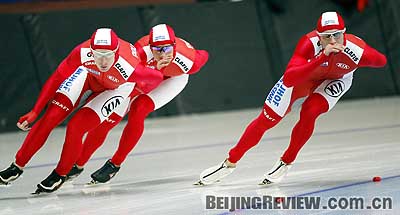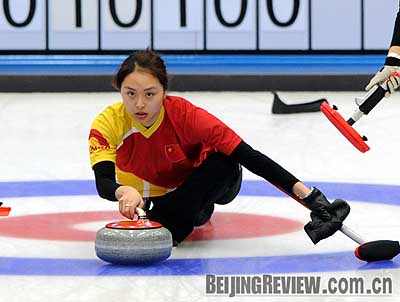|
China's winter sports athletes clinched a record 18 gold medals, followed by Russia and South Korea, at the 24th Winter Universiade that concluded on February 28 in Harbin, northeast China's Heilongjiang Province, after 11 days of fierce competitions.
 |
|
SMOOTH ACTION: Polish skaters compete during the men' team pursuit final of speed skating (FAN JUN) | As the first world comprehensive sports Games held after the 2008 Beijing Olympics, the Harbin Universiade offered a record number of gold medals for 81 events in 12 sports, the most events ever in the history of the Winter Universiade, with 15 new events introduced.
A total of 2,366 participants, aged 17 to 28, from 44 countries and regions across the world took part in the winter sports carnival. In all 15 countries reaped gold, and nine records were broken.
A total of 20 countries made the medal table, with 15 winning gold.
 |
|
GOLD SPIN: Chinese curler Yue Qingshuang is on her way to victory against the Canadian team (XINHUA) | Sending a 347-member delegation, of whom 198 were elite winter sports athletes competing with second-string foreign participants, China collected a record high of 18 golds, 18 silvers and 12 bronzes to top the medal tally, bettering its best ever finish of a third with six golds at the Tarvisio Universiade in Italy in 2003.
Russia, the traditional winter sports powerhouse, which finished at the top of the medal table in four of the last five Winter Universiades, dominated in cross-country and biathlon by winning 16 titles in the two sports, but had to be content with second place overall with 18 golds, 14 silvers and 19 bronzes.
Turin Winter Universiade top finisher South Korea consolidated its reign in speed skating and short-track speed skating, pocketing five golds in each sport to sit in third place with 12 golds, seven silvers and nine bronzes.
The third Asian country entering the top four was Japan, which performed well in snow sports, with seven golds, placing fourth overall with nine golds, eight silvers and three bronzes.
A total of nine Universiade records were broken at the 24th Universiade, all in speed skating.
The next Winter Universiade is scheduled to be held in Erzurum, Turkey, in 2011.
China's golden moments
Ranking 14th at the 2006 Turin Winter Olympics and gaining only three gold medals at the previous Universiade, host China not only showed its depth in speed skating, short track, freestyle aerials and figure skating, but also made breakthrough in such sports as snowboard, curling, ice hockey and biathlon at the Harbin Universiade.
The Harbin Games are the maiden battlefield for the six Chinese women short-track speed skaters. Zhou Yang, 18, came from nowhere to win the first gold medal for China in the women's 1,500-meter race, beating three South Korean rivals in style.
Zhou's compatriot Liu Qiuhong grabbed golds in the 500-meter and 1,000-meter race and the 3,000-meter relay and a silver in the 1,500-meter relay, becoming the athlete who won the most titles and medals at the Harbin Games. Liu, 21, is now ranked second in the world.
The Chinese men skaters won their only gold in the 5,000-meter relay, as the No.4 team in the world took the lead while South Korea stumbled to drop behind with 31 laps left in the race.
China broke South Korea's monopoly in short-track disciplines, splitting the 10 gold medals on offer in Harbin with its neighbor. In the previous two Universiades, South Korea won 18 golds on aggregate.
In speed skating competitions where durability is deemed more important, China collected five gold, eight silver and three bronze medals, despite the injury withdrawals of favorites Wang Beixing and Wang Fei.
All China's speed skating trophies came from the women's competitions: 1,000-meter race by Jin Peiyu, 3,000-meter race by Fu Chunyan and 5,000-meter race by Dong Feifei.
|
